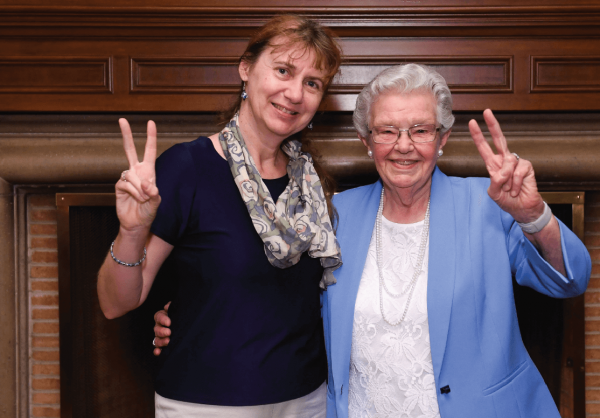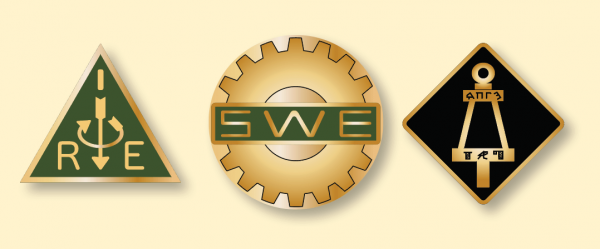She Didn’t Want to Answer Phones. She Designed Fighter Jet Radars Instead.
Gloria Wilson says one of the most important things she learned at USC was how to learn.
“With technology moving so fast, many textbooks were out of date,” said Wilson, B.S. EE ’64, M.S. ’66, “but we had excellent professors who actually worked in industry. They focused on learning to think, to analyze, to create! It was an attitude and culture at USC that carried me through the massive changes occurring in the industry throughout my career.”

Wilson is one of six individuals recognized recently as Half-Century Trojans, a community of alumni who earned degrees from USC at least 50 years ago.
She traveled a historic path at a time when engineering was indisputably exclusively male. At 17, the then-San Diego resident considered joining the Air Force but was told, “Go home, little girl.” “I had an academic adviser in junior college who suggested I try a four-year university,” she recalled. “USC was the logical choice because it was close to home, and my husband’s family included several USC alumni. When I started as a junior, it wasn’t that there were any specific barriers to women. It just seemed I was one of the
only ones.”
She graduated magna cum laude in 1964 with a bachelor of science in electrical engineering — one of only two women in her class. Wilson was a member of the inaugural chapter of Society of Women Engineers at USC, and she was awarded a Hughes Master’s Fellowship.
Finding a job proved challenging as well.
“I was offered a position at PacTel [one of the seven “Baby Bells” that in 1984 spun off from AT&T], but they said I would be supervising telephone operators,” she said. “That wasn’t interesting to me. I wanted to build things.”
Wilson eventually landed a position at Hughes Aircraft, where she stayed for 30-plus years, rising to top management positions. She was one of the early contributors to the application of digital signal processing to military missions and was part of the original design team of the first multimode digital airborne radar. She participated both as designer and project manager on such well-known systems as the F-14, F-15 and F/A-18 tactical fighter radar systems.
“Hughes offered me an opportunity to be an actual engineer, and they said they would also pay for my master’s degree,” she said. “I was sold.” She completed her master’s degree in 1966.
As more powerful computer technology became available, she was responsible for creating the first engineering computer-aided design facility for the Radar Systems Group in 1978. That organization grew to a staff of 110 engineers, programmers and technicians.
In 1981, she formed her own consulting business specializing in the areas of engineering management, quality and CAD/CAM. She also provided training in the use of personal computers as well as engineering and business software.
Her decades of professional achievement were juxtaposed with the field’s enormous shift from analog circuits to complex technology.
“I benefited from timing,” she said. “The thing that made the difference for me was discipline. I was taught how to think and to solve problems, not to just memorize things.”
A longtime supporter of the USC Viterbi School of Engineering and the Keck School of Medicine of USC, Wilson is a member of the Institute of Electrical and Electronics Engineers, and the honor societies Tau Beta Pi, Phi Kappa Phi and Eta Kappa Nu. She is also a lifetime member of the Viterbi Society and a Viterbi Innovation Partners Member.
These days, Wilson volunteers several hours a week, in her areas of expertise, for nonprofit organizations, and she has found many ways to engage and inspire her community, including her work for Van Nuys-based The Church on the Way from 1981 to the mid-1990s. Enjoying expo-
nential growth and expansion, the church years ago faced a challenge with a computer used in the production of its weekly television program. With her engineering background, Wilson came to the rescue.
Along with her accomplishments, Wilson’s legacy is cemented by how she changed people’s ideas of what an engineer looks like.
“I always tried to conduct myself as a professional, and was blessed to have that attitude of respect returned by my colleagues and classmates,” she said. “I was never a big proponent of things that didn’t treat people equally, and after a year or so, my performance spoke for me. There was one man who once said, ‘I ain’t working for no woman.’ We ended up becoming friends.”
What would she advise today’s students — men and women — who are trying to forge their own path?
“I received very good advice along the way,” Wilson said. “Never pass up anything you are offered to learn.”




